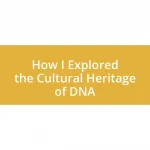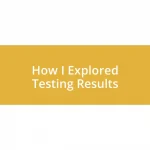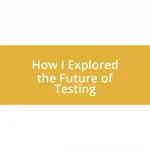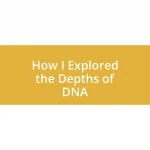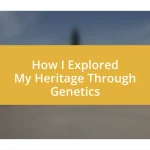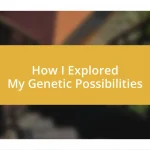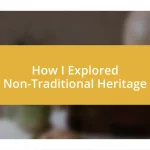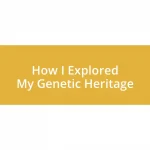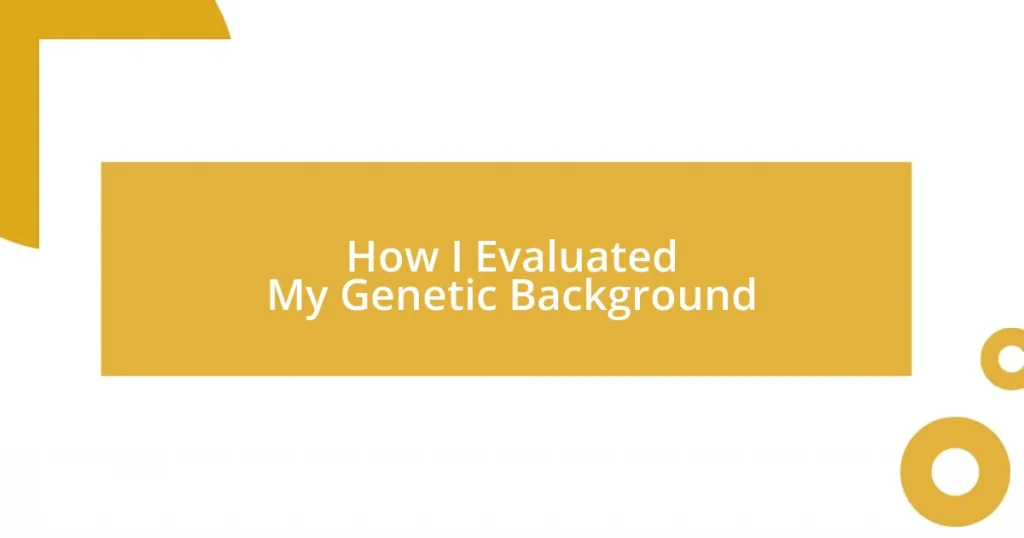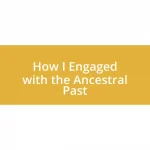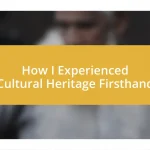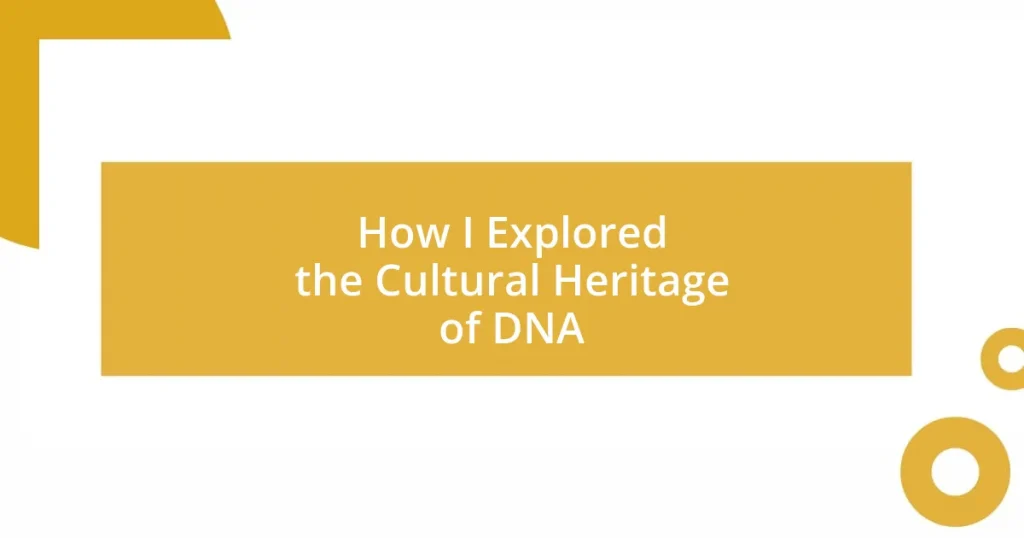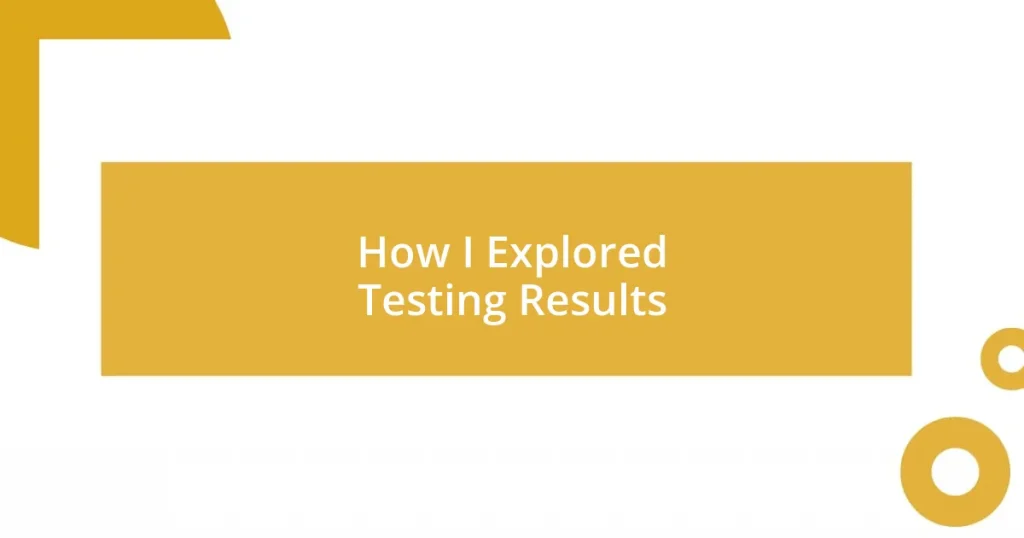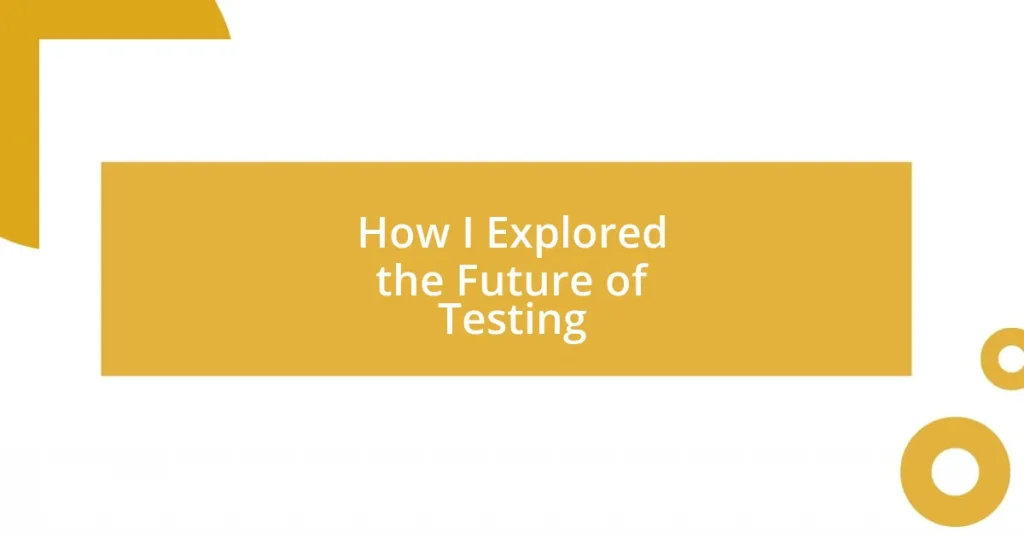Key takeaways:
- Understanding genetic background enhances insights into ancestry and health risks, prompting more informed lifestyle choices.
- Choosing the right DNA test requires balancing health information with ancestry insights for a comprehensive understanding.
- Gathering family health history reveals hereditary risks, prompting proactive health management and lifestyle changes.
- Sharing genetic findings with family fosters connection, pride, and a deeper understanding of shared heritage and identity.
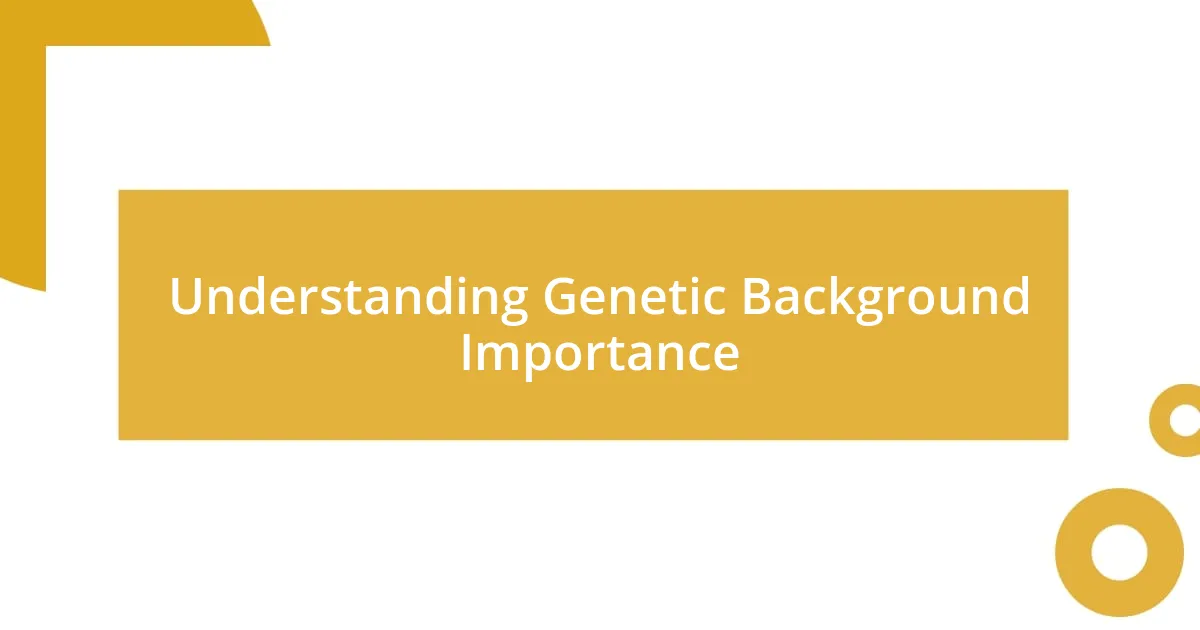
Understanding Genetic Background Importance
Understanding my genetic background has been eye-opening, revealing not just my ancestry but also nuances about my health. I remember the surprise I felt during a family gathering when a distant cousin shared how our shared lineage might carry certain hereditary risks. It made me wonder: what else might I be carrying in my genes?
The importance of assessing one’s genetic makeup cannot be overstated, especially when it comes to informing health decisions. For instance, I learned that my family has a history of hypertension, which influenced my approach to lifestyle choices. Have you ever considered how your own genealogy might shape your future health?
Delving into my genetic background helped me appreciate the blend of cultures I’m part of and the unique stories behind them. As I explored different branches of my family tree, I felt a deep connection to those who came before me. It raised a profound question: how much do we truly know about the legacies we inherit?
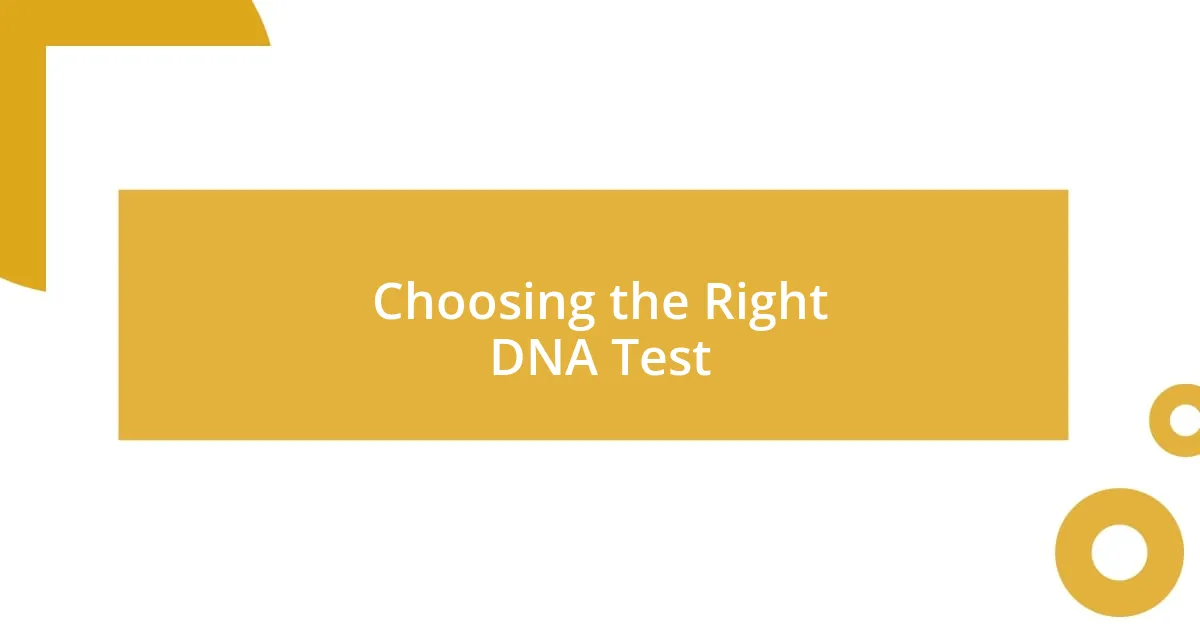
Choosing the Right DNA Test
Choosing the right DNA test can feel overwhelming, especially with the myriad options available. I recall standing in the aisle of a drugstore, staring at several kits, wondering which would provide me with the most informative results. Each kit boasted unique features, which made my decision even more challenging—should I go for a health-focused test or one that emphasizes ancestry?
After thorough research, I learned about the importance of testing for both health and heritage. Some kits specialize in providing comprehensive health reports, while others focus on scraping the surface of ethnic backgrounds. I found that a blend of both could truly enrich my understanding. For example, one test I considered offered extensive health risk assessments, so I could get insights on conditions I might be predisposed to, alongside tracing my roots back through generations.
To help clarify your options, here’s a comparison of popular DNA tests:
| DNA Test | Focus Area |
|---|---|
| 23andMe | Health Reports & Ancestry |
| AncestryDNA | Ethnic Origins |
| MyHeritage DNA | Family Tree Building & Ancestry |
| Everlywell | Health and Wellness Insights |
As I weighed these options, I asked myself: what did I truly want from this experience? Ultimately, I aimed for a deeper understanding of both my ancestral roots and health predispositions. That blend of knowledge felt just right.
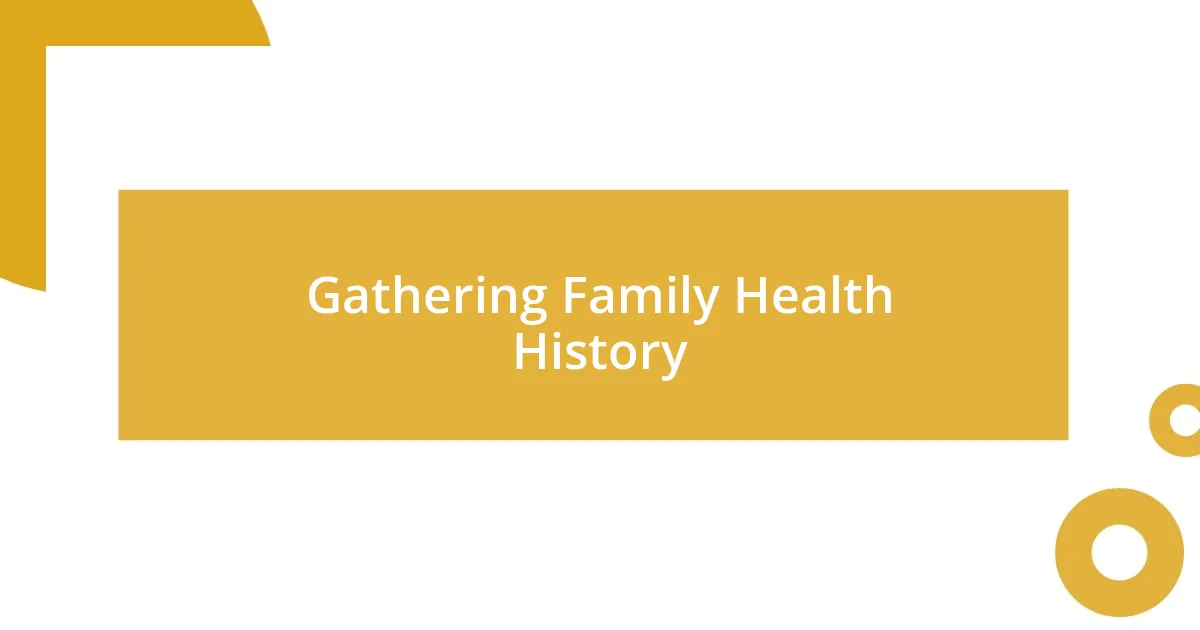
Gathering Family Health History
Gathering family health history can be an incredibly revealing experience. I still remember sitting down with my parents, sifting through old medical records and scribbled notes from family gatherings. It was like unlocking a treasure chest of information, each piece offering clues about health conditions that might have been passed down to me. This process not only opened my eyes to hereditary risks, but it also likely impacts my decisions moving forward.
When I finally sat down with a family tree chart, I was surprised to discover patterns I hadn’t noticed before. For example:
- My grandmother had a history of diabetes, which prompted me to be more mindful of my own dietary choices.
- Several relatives battled heart disease, making me consider regular check-ups as a vital part of my routine.
- I found out that an aunt had struggled with mental health challenges, which led me to reflect on the importance of emotional well-being in my own life.
Having this information has profoundly shaped my approach to health and wellness. By gathering this history, I felt more anchored and informed about what I need to prioritize. Using conversations with family members as a springboard, I realized that digging into family health history isn’t just about discovering potential risks; it’s about creating a path for more proactive and informed living.
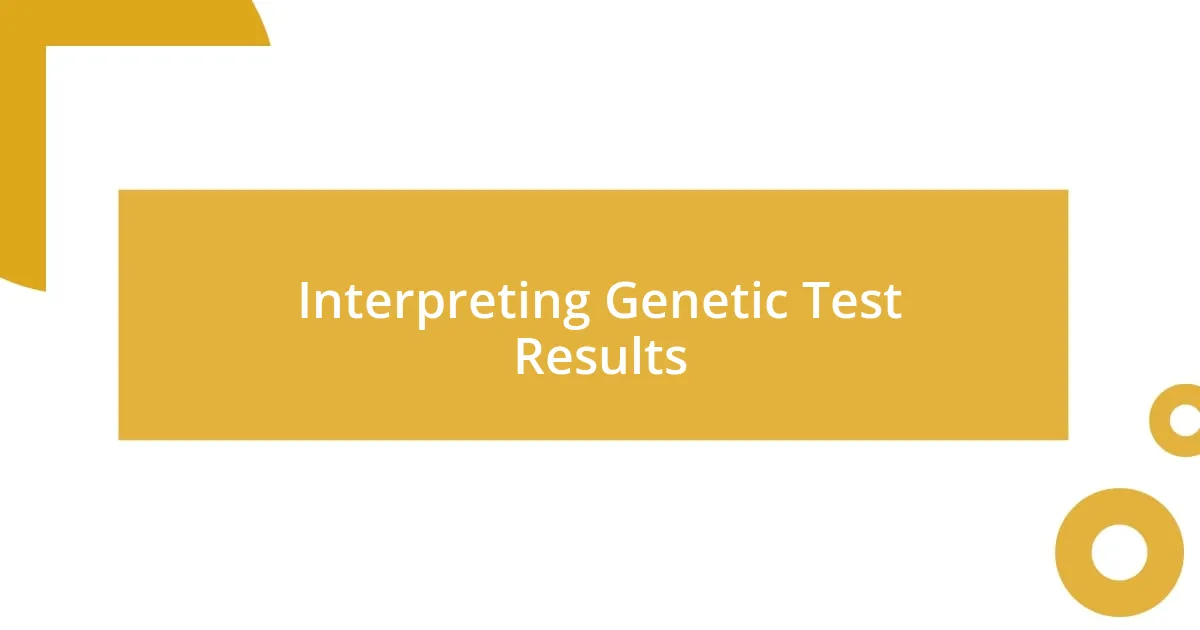
Interpreting Genetic Test Results
Interpreting genetic test results can be both exciting and daunting. I remember the first time I opened my report, feeling a mix of anticipation and anxiety. As I scanned the findings, trying to make sense of percentages and risk factors, I realized that these numbers represented so much more than data; they were insights into my identity and health.
For instance, when I discovered that I was predisposed to certain conditions, it hit me emotionally. I wasn’t just reading a result; I was seeing pieces of my family’s history reflected in my own DNA. Questions flooded my mind: How do I take action based on this information? What lifestyle changes should I consider? Engaging with my results meant understanding the nuances and implications that would guide my choices moving forward.
A significant moment came when I connected my genetic predispositions with lifestyle factors. I learned, for example, that my risk for high cholesterol could be mitigated through diet and exercise. This realization sparked a deeper commitment to a healthier lifestyle. The results became a powerful motivator for change, transforming abstract data into actionable steps that felt personal and achievable.
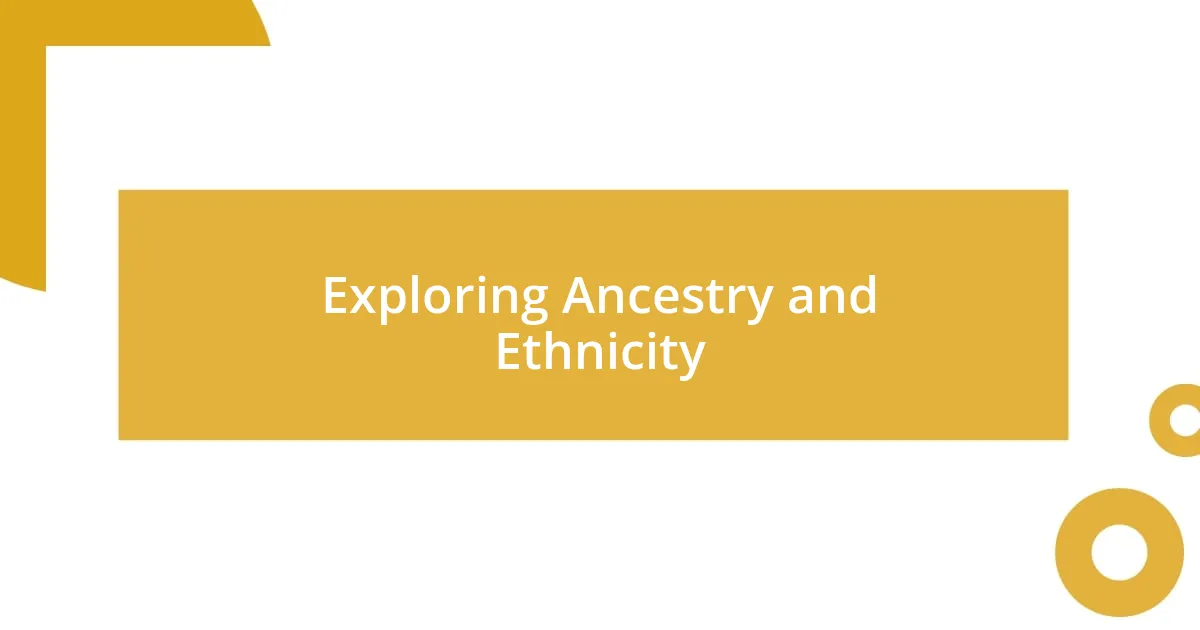
Exploring Ancestry and Ethnicity
Exploring my ancestry and ethnicity brought a whole new dimension to my understanding of self. When I decided to look deeper into my roots, I found more than just names and dates; I unearthed stories that resonated through generations. As I traced my family tree, I couldn’t help but wonder how these diverse backgrounds shaped my identity today.
I recall a moment of sheer surprise when I discovered that my great-grandmother had emigrated from Italy. This revelation added layers of richness to my heritage. I began to reflect on the cultural traditions she carried with her, from her Italian recipes to her love for festive gatherings filled with laughter and music. I found myself wanting to embrace these customs, feeling a desire to reconnect with a part of my ancestry I hadn’t fully acknowledged.
Delving into this exploration led me to reconsider not just my family history, but also how it influences my values and aspirations. Have you ever thought about how a single story from your past can shape your future decisions? I found that learning about my ethnicity helped me appreciate the sacrifices made by my ancestors, pushing me to strive for a legacy of resilience and connection. Each discovery was like a thread weaving my identity into a vibrant tapestry, reminding me that my heritage is not just a backdrop, but a driving force in who I am today.
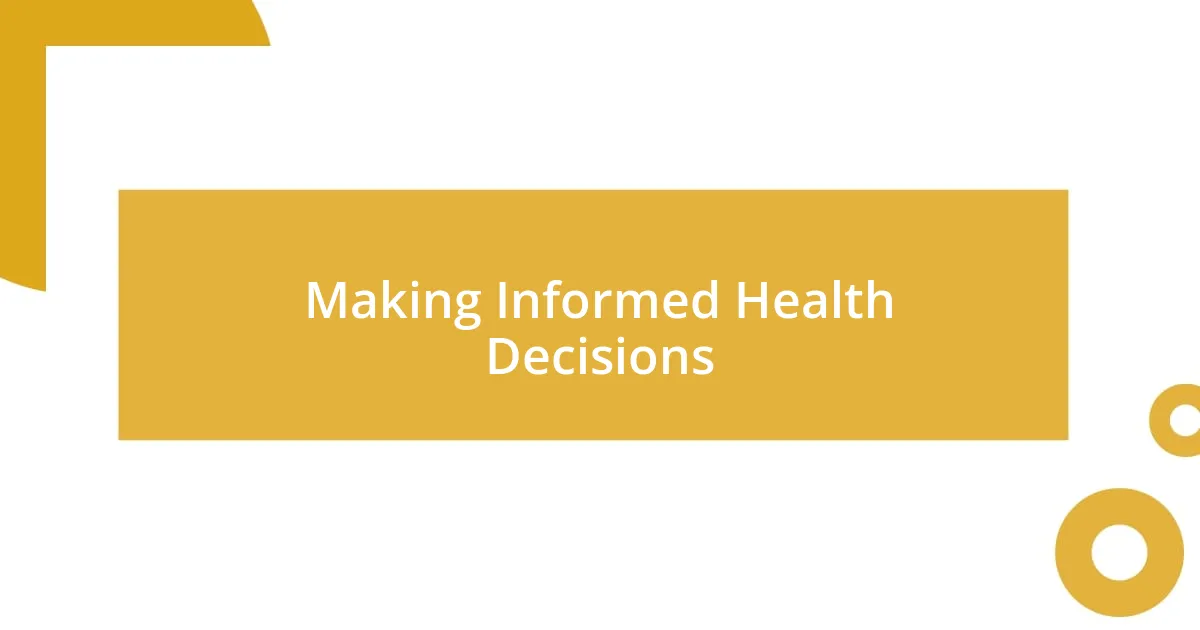
Making Informed Health Decisions
Making informed health decisions based on genetic information can really shift your perspective on wellness. I remember feeling overwhelmed when my genetic results indicated a higher risk for certain diseases. It raised a question I didn’t expect: Could my choices actively influence my health outlook? That thought was empowering and made me realize how proactive I could be.
As I dove deeper into understanding my results, it struck me how intertwined genetics and lifestyle truly are. One day, while cooking dinner, I decided to experiment with a heart-healthy recipe after learning about my cholesterol risk. That small change felt monumental. It wasn’t just about changing my diet; it was a personal commitment to my health and wellbeing, translating raw data into daily choices that mattered.
Embracing these insights led me to seek out regular check-ups and discussions with my healthcare provider. Have you considered how your genetic makeup could impact your healthcare plans? I found that understanding my genetic risks opened the door to more meaningful conversations. Each appointment wasn’t just a routine visit; they became strategies for leveraging my genetics to maintain my health in a proactive way.
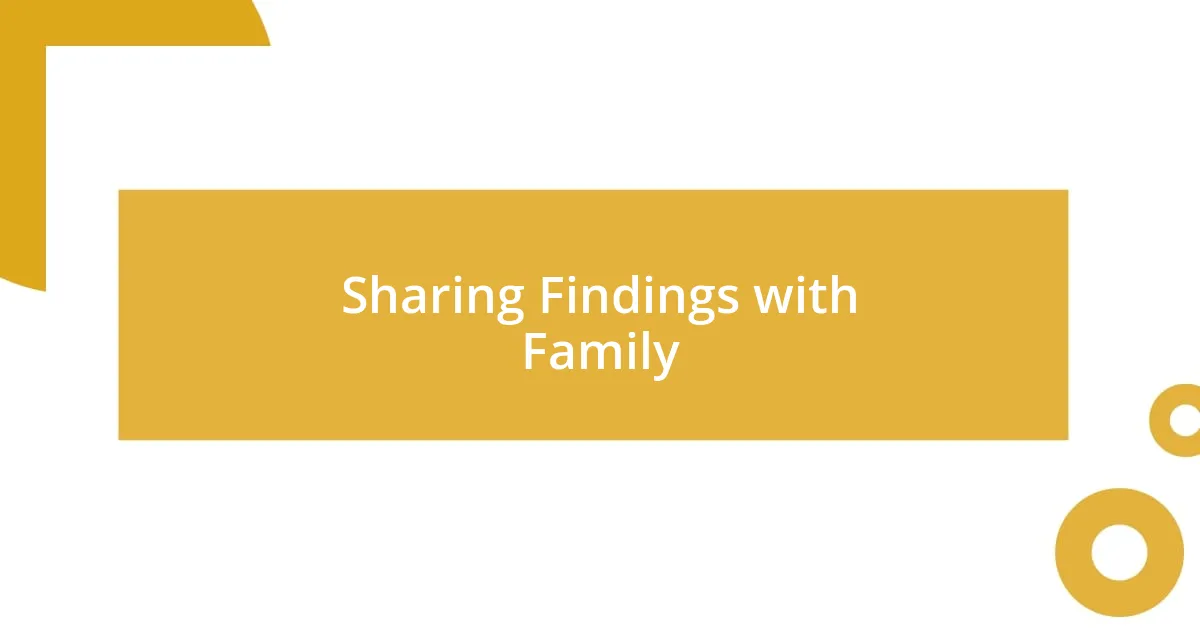
Sharing Findings with Family
When I finally gathered the courage to share my genetic findings with my family, the reactions were a mix of curiosity and surprise. My cousin’s eyes widened as I recounted how we share a distant ancestor who fought in a significant historical battle. It sparked debates about our family’s role in history and the pride that came with it, making the past feel very tangible and relevant.
During dinner one evening, I brought up my findings, and the table erupted into stories from our childhood that echoed our shared heritage. My aunt recalled how my grandmother always spoke about our Italian roots, weaving in fables that connected us to a larger narrative. It struck me how our histories aren’t just facts; they are woven into the stories we tell and share, creating continuity in our family’s journey.
Overall, these moments made me realize the importance of family dialogue around genetic discovery. Has anyone else felt the significance of their lineage in casual conversations? I found that discussing these findings not only enriched our family bond but also encouraged a sense of pride and curiosity in our shared identity. Each story revealed added depth to my understanding of where I come from, and it was heartwarming to see my family engage in this shared exploration of our past.
